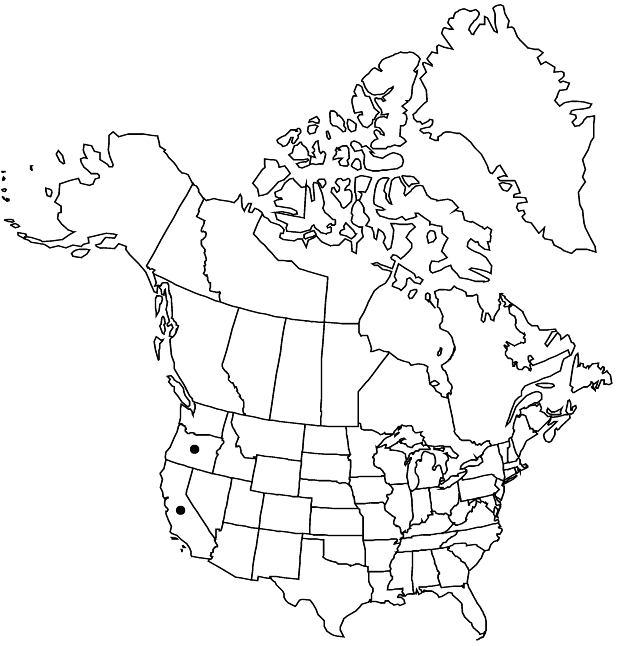Difference between revisions of "Arctostaphylos nortensis"
Four Seasons 9(2): 56. 1992 ,.
FNA>Volume Importer |
imported>Volume Importer |
||
| (6 intermediate revisions by 2 users not shown) | |||
| Line 7: | Line 7: | ||
}} | }} | ||
|common_names=Del Norte manzanita | |common_names=Del Norte manzanita | ||
| − | |basionyms={{Treatment/ID/ | + | |special_status={{Treatment/ID/Special_status |
| + | |code=E | ||
| + | |label=Endemic | ||
| + | }}{{Treatment/ID/Special_status | ||
| + | |code=C | ||
| + | |label=Conservation concern | ||
| + | }} | ||
| + | |basionyms={{Treatment/ID/Basionym | ||
|name=Arctostaphylos columbiana subsp. nortensis | |name=Arctostaphylos columbiana subsp. nortensis | ||
|authority=P. V. Wells | |authority=P. V. Wells | ||
| + | |rank=subspecies | ||
| + | |publication_title=Four Seasons | ||
| + | |publication_place=8(1): 50. 1988 | ||
}} | }} | ||
|synonyms= | |synonyms= | ||
| Line 27: | Line 37: | ||
|distribution=Calif.;Oreg. | |distribution=Calif.;Oreg. | ||
|discussion=<p>Of conservation concern.</p><!-- | |discussion=<p>Of conservation concern.</p><!-- | ||
| − | --><p>Arctostaphylos nortensis occurs on upland peridodite soils in the interior mountains of Del Norte County, California, and adjacent Curry and Josephine counties, Oregon. It appears to be a distinct entity and well distributed in this limited region; it could be confused with hybrids between A. canescens and A. viscida that have been described from the interior portion of its range. In the protologue, Wells did not mention their glandular pubescence, clearly visible on the type specimen; this feature can be difficult to discern in some herbarium specimens. The region of northwestern California and adjacent southwestern Oregon needs more study, this taxon being one example.</p> | + | --><p><i>Arctostaphylos nortensis</i> occurs on upland peridodite soils in the interior mountains of Del Norte County, California, and adjacent Curry and Josephine counties, Oregon. It appears to be a distinct entity and well distributed in this limited region; it could be confused with hybrids between <i>A. canescens</i> and <i>A. viscida</i> that have been described from the interior portion of its range. In the protologue, Wells did not mention their glandular pubescence, clearly visible on the type specimen; this feature can be difficult to discern in some herbarium specimens. The region of northwestern California and adjacent southwestern Oregon needs more study, this taxon being one example.</p> |
|tables= | |tables= | ||
|references= | |references= | ||
| Line 36: | Line 46: | ||
-->{{#Taxon: | -->{{#Taxon: | ||
name=Arctostaphylos nortensis | name=Arctostaphylos nortensis | ||
| − | |||
|authority=(P. V. Wells) P. V. Wells | |authority=(P. V. Wells) P. V. Wells | ||
|rank=species | |rank=species | ||
| Line 50: | Line 59: | ||
|publication title=Four Seasons | |publication title=Four Seasons | ||
|publication year= | |publication year= | ||
| − | |special status= | + | |special status=Endemic;Conservation concern |
| − | |source xml=https:// | + | |source xml=https://bitbucket.org/aafc-mbb/fna-data-curation/src/2e0870ddd59836b60bcf96646a41e87ea5a5943a/coarse_grained_fna_xml/V8/V8_815.xml |
|subfamily=Ericaceae subfam. Arbutoideae | |subfamily=Ericaceae subfam. Arbutoideae | ||
|genus=Arctostaphylos | |genus=Arctostaphylos | ||
Latest revision as of 22:46, 5 November 2020
Shrubs or trees, erect, 2–5 m; burl absent; twigs soft-hairy with minute glands on cryptic, short hairs or at tips of longer, hispid hairs. Leaves: petiole 4–5 mm; blade gray-glaucous, becoming dark green, dull, narrowly elliptic-ovate, 2–4 × 1–2 cm, base truncate to rounded, margins entire, plane, (sometimes sparsely ciliate), surfaces smooth, finely white-tomentose or glabrous. Inflorescences racemes, simple or 1-branched; immature inflorescence pendent, (branches crowded, bell-shaped, ± obscured by bracts), axis 0.5–1.2 cm, 1+ mm diam., soft-hairy with minute glands on cryptic, short hairs or at tips of longer, hispid hairs; bracts not appressed, (green), leaflike, ovate, 5–10 mm, apex acute, surfaces hairy, (also with longer hairs). Pedicels 2–4 mm, sparsely white-hairy. Flowers: corolla white, conic to urceolate; ovary densely white-hairy. Fruits depressed-globose, 6–8 mm diam., sparsely white-hairy. Stones distinct. 2n = 26.
Phenology: Flowering late winter–late spring.
Habitat: Chaparral, open forests
Elevation: 400-600 m
Discussion
Of conservation concern.
Arctostaphylos nortensis occurs on upland peridodite soils in the interior mountains of Del Norte County, California, and adjacent Curry and Josephine counties, Oregon. It appears to be a distinct entity and well distributed in this limited region; it could be confused with hybrids between A. canescens and A. viscida that have been described from the interior portion of its range. In the protologue, Wells did not mention their glandular pubescence, clearly visible on the type specimen; this feature can be difficult to discern in some herbarium specimens. The region of northwestern California and adjacent southwestern Oregon needs more study, this taxon being one example.
Selected References
None.
